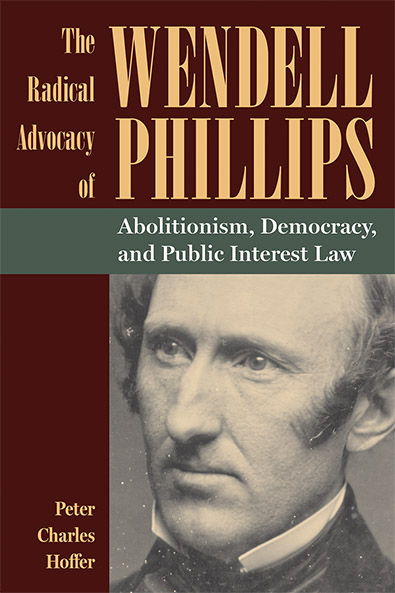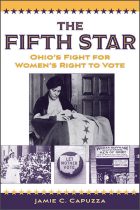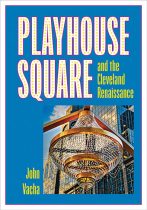The Radical Advocacy of Wendell Phillips
Abolitionism, Democracy, and Public Interest Law
American Abolitionism and Antislavery, Justice Studies, Recent Releases, U.S. HistoryPeter Charles Hoffer
In this brisk, engaging exploration of 19th-century radical reformer and abolitionist Wendell Phillips, Peter Charles Hoffer makes the case that Phillips deserves credit as the nation’s first public interest lawyer, someone who led the antebellum crusade against slavery and championed First Amendment rights and equality for all Americans, including Black people and women. As a young lawyer, bored and working at a languishing practice, Phillips nonetheless believed that the law would serve as the basis for meaningful social change, including the abolishment of slavery. While many believed the US Constitution was a virtually faultless, foundational document for governance, Phillips viewed it as deeply racist, proslavery, and, therefore, in contradiction to the Declaration of Independence. Unsurprisingly, many of Phillips’s ideas were viewed as controversial and unpopular at the time, even with other abolitionists. He frequently disagreed with more conservative politicians, including Abraham Lincoln. But beyond merely criticizing the Constitution, Phillips subscribed to a “democratic positivist” belief, which contends that law is the central component of a strong democracy and that law can and should be changed by the will of the people. Thus, he believed it was critical to change public opinion on issues like slavery, which in turn would help change laws that legalized the institution. Throughout his life, he used his impressive skills as an orator to raise awareness to the horrors of enslavement, appealed to Americans’ consciences, and directed them to act through voting and lawmaking. Democratic positivist approaches like his have continued to be used by lawyers to influence social reforms ranging from the civil rights movement of the 1960s to advocacy for unhoused people to abolishing America’s carceral state, and Hoffer persuasively argues that Phillips’s influence has been long ranging and is still recognizable in contemporary America’s political landscape. “With literary grace and scholarly authority, respected legal historian Charles Peter Hoffer reveals a previously unexamined aspect of radical reformer Wendell Phillips’s career. . . . An elegant and gripping saga of the triumph of the struggle for equality for all people.”—Douglas R. Egerton, author of Man on Fire: The Worlds of Thomas Wentworth Higginson *** Impressively researched and incisively argued, The Radical Advocacy of Wendell Phillips compels readers to think harder about the kind of democracy we currently inhabit—and might actively pursue.” —Michael J. Birkner, editor of James Buchanan and the Political Crisis of the 1850s *** “Wendell Phillips, the Harvard-educated lawyer, mostly stepped away from his legal practice in the mid-1830s to become a full-time social reformer, abolitionist, agitator, and public speaker. Phillips did not argue great cases before judges in courts; he argued them in the court of public opinion and in the court of history. Hoffer intriguingly argues that Phillips was the first public interest lawyer in American history, using his education and legal skills to challenge slavery, segregation, and racism for a half century. It is a very useful addition to our understanding of Phillips’s role in abolition, women’s rights, and other 19th-century social reforms.”—Paul Finkelman, Robert F. Boden Visiting Professor of Law, Marquette University Law School *** “Peter Hoffer’s incisive study provides a needed framework for reconsidering Phillips’s fight for the abolition of slavery and other reforms by grounding his potent oratory in deeply held notions about public interest lawyering and democratic positivism. Without excusing Phillips’s limitations and ideological inconsistencies, especially on the legality of disunion, Hoffer’s story is inspirational. Phillips’s confidence in rallying the voting public behind constitutional reforms speaks to modern frustrations over matters like malapportionment and the seeming insensitivity of today’s Supreme Court to the will of the majority.”—Robert E. May, author of Yuletide in Dixie: Slavery, Christmas, and Southern Memory





